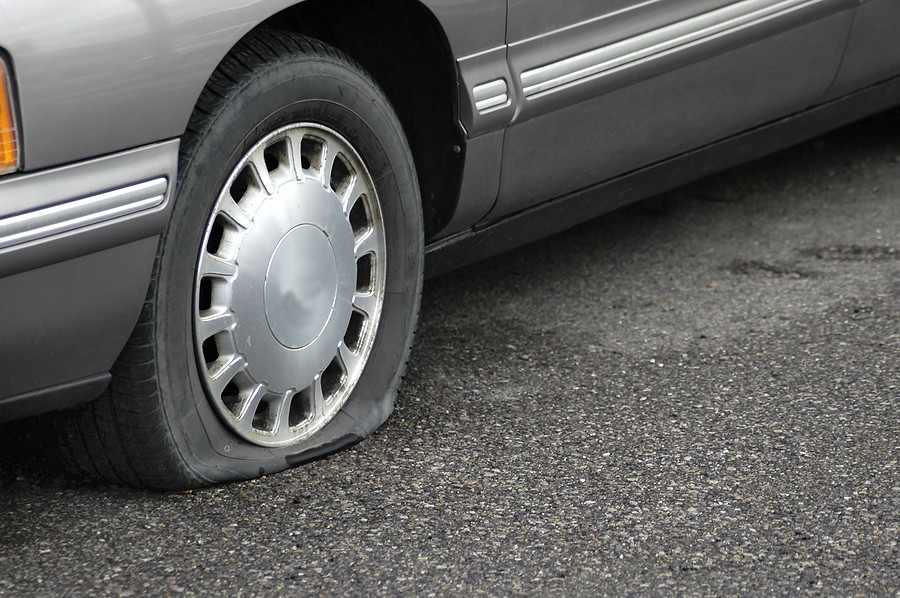If you've ever wondered, “why does my tire go flat?” Here are the 10 most common causes:
- Sharp objects cause punctures
- The valve stem is damaged
- The tires are ripped
- The tire beads are not in good condition
- Problems with vandalism
- Collision with another object
- Tires are overinflated
- Wheels alloys are leaking
- The road has potential hazards
- You're dealing with an unexpected damage
Most people had to deal with a flat tire at some point in their vehicle’s lifetime. It's a very frustrating situation, and when it happens, it happens without any preparation, which means you get to act immediately to resolve the issue.
Things get very complicated if you don't have previous experience dealing with a flat tire. Sometimes the flat tire situation is very continuous, which means there is an underlying problem causing this issue other than sudden scattered situations.
Every driver must understand the main causes of flat tires. This way, they don't have to worry about inconvenient situations, and they will be prepared for how to deal with these flat tires or at least how to prevent them if they are preventable.
This article provides a detailed summary of the 10 most common causes of flat tires. This way, you can answer the question, “why does my tire go flats?”
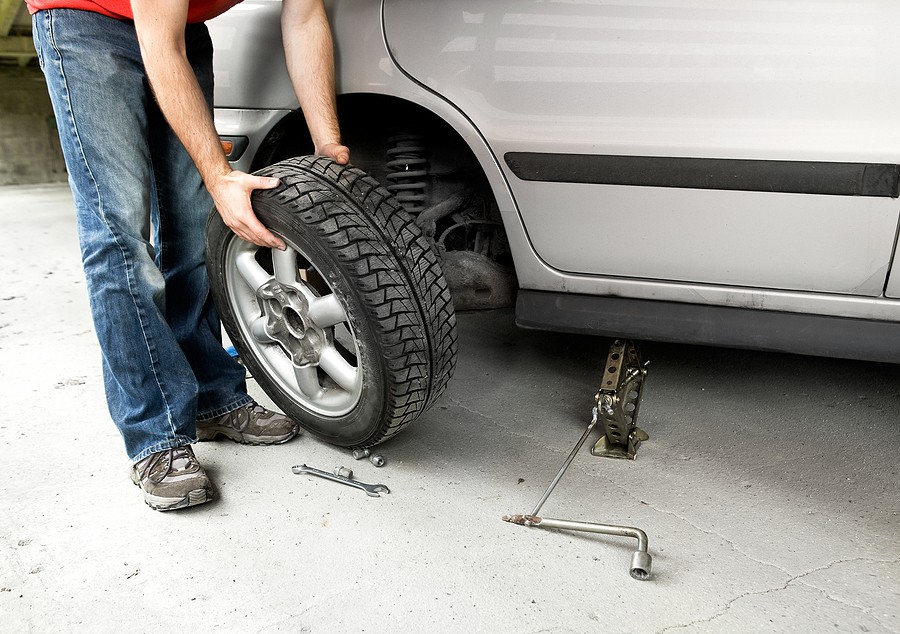
Why does my tire go flat?
Flat tires are not simple because they can easily lead to significant outcomes, especially if you ignore them. The problems become more often when your flood tire is an ongoing problem that has to do with another underlying issue.
The following list provides a detailed summary of what automotive experts realized as the main causes of flat tires. Let's look at what you need to know to answer the question, “why does my tire go flat?”
1. Sharp objects caused punctures
The first and most common reason for dealing with flat tires is when you drive over a sharp object. This sharp object can easily cause a puncture in your tire, leading to pressure escaping from the tire and ending you with a flat tire.
There are many types of sharp objects that you can drive over, like nails or probably glass or any other types of sharp objects that could be on the road.
Typically, you must pay attention to what's in front of you when you drive over a road. There are many situations where you can avoid driving over these sharp objects as much as possible. However, there are some instances where things are not avoidable, so if that happens, get up immediately, take a look at the tire and try to fix it before it gets to a point where all the pressure escapes from the tire and where you deal with additional problems.
2. The valve stem is damaged
Another common potential reason for flat tires is when you have a problem with the valve stem. The valve stem is the small valve that you unscrew to inflate your tire when it needs some pressure. This valve stem could have all types of problems because it's not designed to last forever, and there will be a point where it goes bad. No matter how much air you put inside the tire, this air will escape, and you will end up with a flat tire.
It is important for you as a driver to regularly check on the valve stems and confirm that they are in good condition. In addition, your mechanics should have a better eye for determining whether the valve stem is in good condition or not. Once it's determined to be bad, you got to replace it before dealing with other consequences that could cost you the vehicle, if not your life.
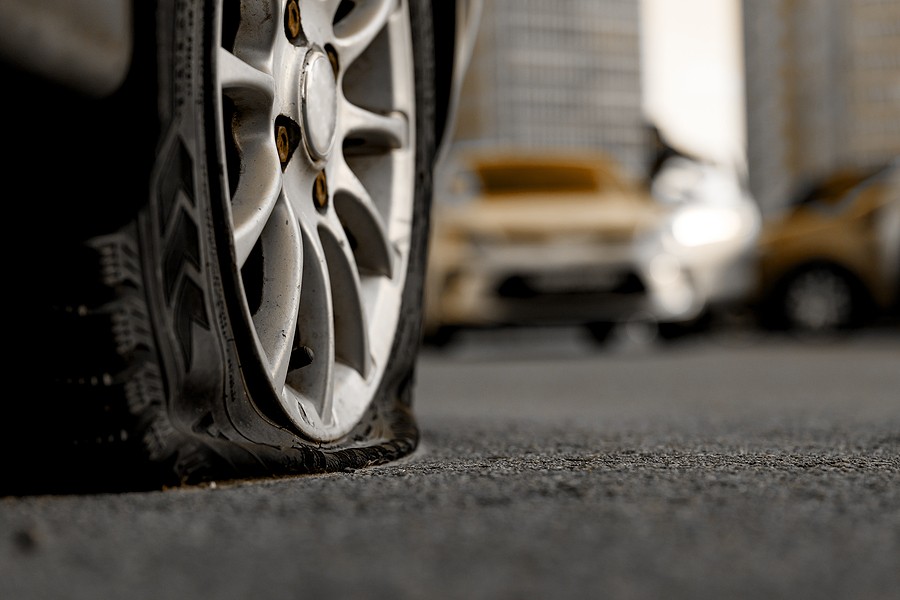
3. The tires are ripped
Similar to problems with the valve stem, sometimes the tire itself might have certain issues as it gets older. So, for example, if you realize that some rips around the tire, you got to take it seriously before it gets to a point where you can't control your vehicle or get involved in major car accidents.
You can perform regular inspections of your tires and determine how much trade you have, and confirm that there are no signs of wear or tear around the tire edges. If you confirm some issues, you'd better replace the tire. Typically, the tires should go bad together, and once you perform tire rotation, you can get additional time from the vehicle’s tires lifespan, but at some point, we get our place them.
Depending on your manufacturer, sometimes you might be allowed to replace two tires on the same axle at the same time, but in some vehicles and depending on some other brands, you might be required to replace all four tires at the same time.
Of course, you can never replace one tire unless all other tires are pretty good or relatively new, but it's typically not the case.
4. The tire beads are not in good condition
In addition to the tire walls, there are some beats around the tires. These beads are where the edge of the tire wrist is on the rim. Again, the beads are not designed to last forever, and at some point, they can go bad, and when they do, you get a replace the tire immediately.
Ignoring beads problems can easily lead to additional damage to your tires and other components like the suspension system and the wheels. Therefore, take a look at the beads and confirm that they're not in bad shape before inflating the tire, thinking that it's a problem with the tire pressure.
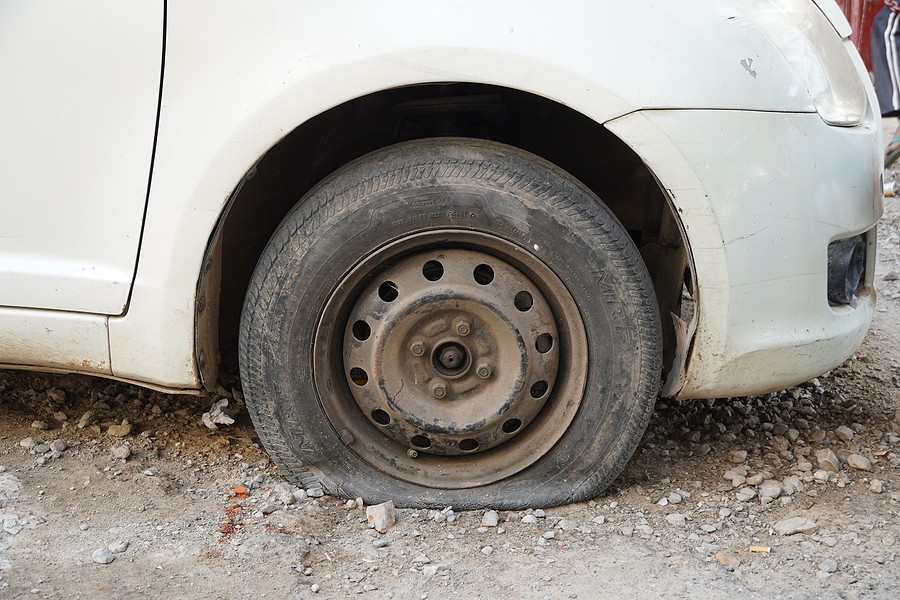
5. Problems with vandalism
On some rare occasions, some people might use vandalism against each other. In other words, they can open the valve stand and allow air to escape from your vehicle higher. If that's the case, the first thing you want to do is confirm that you're parking your vehicle in a safe location where some of those people do not get to your car.
Also, try the first thing by inflating your tires to see if it's not an internal problem. Once you inflate the tire, you can confirm that someone left the valve stem open, and you can secure it and then decide on the next steps to prevent the situation from happening one more time.
6. Collision with another object
If you got involved in a major car accident and your vehicle hit another object or car, there's a very high chance that your tires might go flat because of damages that could happen suddenly to the tires. Tires are not designed to handle these damages, and once the major coalition happens, get up and take a look at the tire and all other components that got impacted.
In some scenarios, you might need to inflate the tire one more time, and on another major occasion, you will most likely need to replace the tires to avoid dealing with other complications.
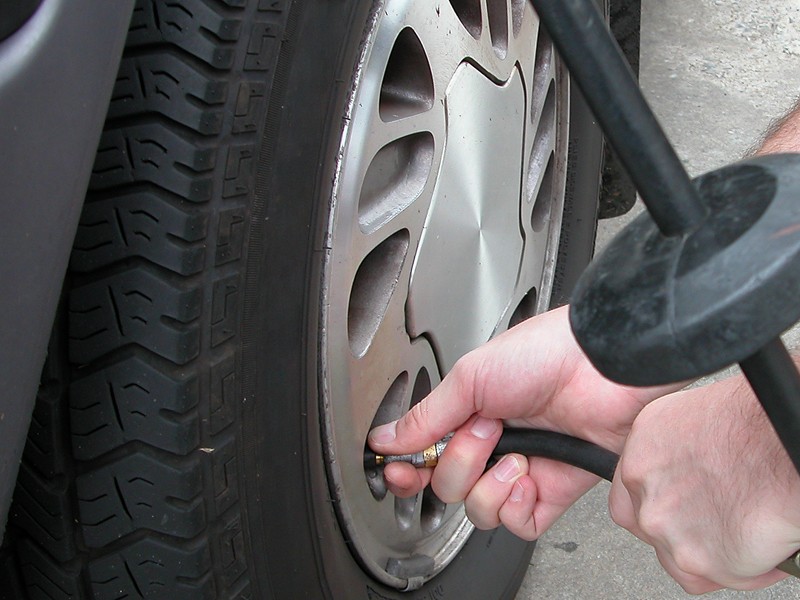
7. Tires are overinflated
Did you know that too much pressure is also not good?! Yes! Many people think that the more they put pressure on their vehicle, the better it is for the car. However, if you are overinflating your tires to a certain point, there's a very high chance that the tires are no longer going to operate properly, and you might deal with situations where these tires go flat at some point.
Thus, we highly encourage you to look up your vehicle's owner’s manual or check online for recommendations on how much pressure to put on your vehicle. Keep in mind that the pressure might differ if you're driving in the summer versus the winter season because the temperature impacts
8. Wheels alloys are leaking
In addition to tire problems, sometimes there might be issues with the wheels themselves. However, in the location between the wheel and the tire around the alloys, you can easily deal with some damages that get you to a point where you ask yourself, “why does my tire go flat?”
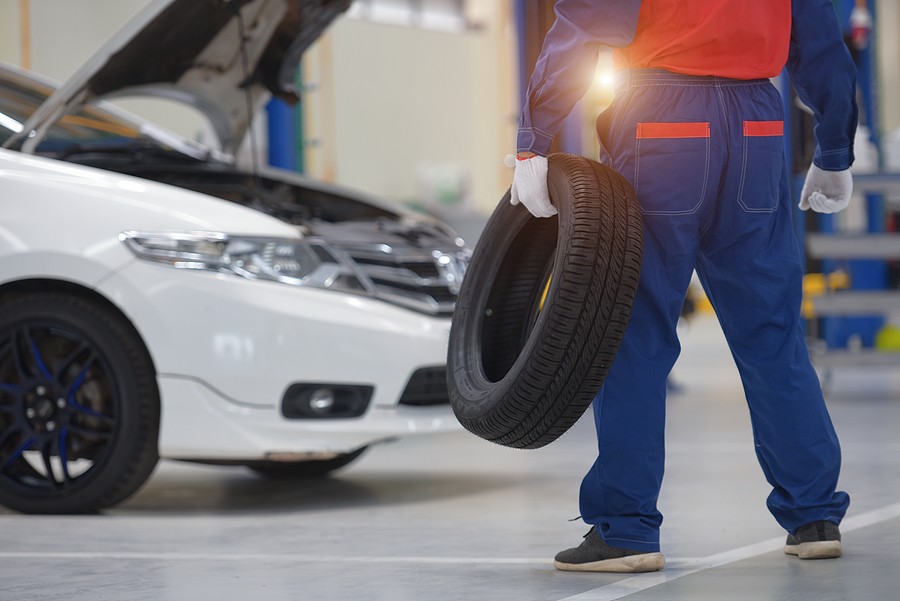
9. The road has potential hazards
Not only does driving over sharp objects cause flat tires but also driving through path holes or uneven roads, or even sudden debris may I right cause your tire to go flat. Therefore, it is important again that you keep an eye on the road and avoid these things as much as possible.
Sometimes there might be just one pothole in the world where you can pass it easily without causing any damage to your tires and any other components. However, you might be driving over an uneven road where things are not available. If you get up, just keep an eye on the tires and try just driving as slow as possible until you get out of these unpaved roads.
10. You're dealing with an unexpected damage
Finally, unexpected damages are very often, and you can easily deal with sudden breakdowns in your tires without preparation. But, again, this could be a minor issue that developed over time and never paid attention to.
That's why we always recommend that you regularly keep an eye on the tires and regularly consult the mechanic. In addition, your vehicle's owner’s manual should have recommendations on how often you shouldn't expect the tires and when you should do a tire rotation. All these actions help you prevent dealing with a flat tire, and you can always ask the question to your mechanic and say, “why does my tire go flat?”
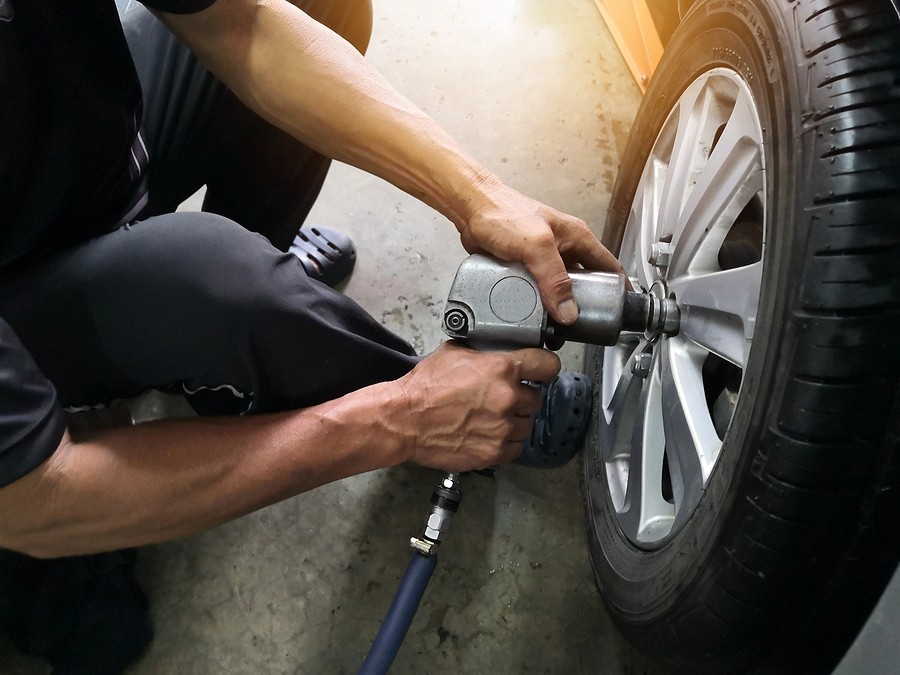
How much does it cost to fix a flat tire?
It depends. Sometimes you can easily get rid of the flat tire problem by investing in minor commercial products for only somewhere between $10 and $20. However, things can easily pile up in difficult situations depending on the root cause of the problem, which has its repair costs.
As we mentioned earlier, sometimes your problem is not related to the tire itself. It could be an issue with uneven clear and tear because of a problem with the suspension system, the steering wheel, or other components. No matter how much you invest in the best quality tire, they'll get damaged or worn out because you did not solve the root problem. Therefore, deciding on how much it will cost you to fix a flat tire depends on what problem you're dealing with and whether you are now fixing it or not.
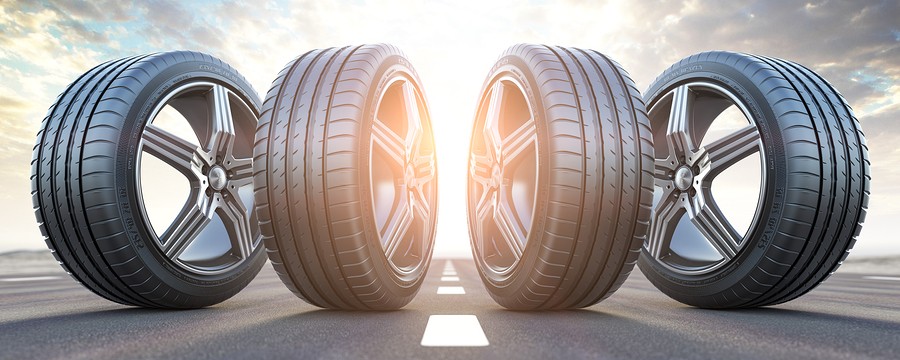
Final thoughts
“Why does my tire go flat?” is a very common question from many of our readers. But it's typically a question from inexperienced drivers who are unaware of all the typical situations that could cause the tires to go bad.
This article walked you through 10 important common causes of flat tires. We highly encourage you to go through these causes to prevent these situations from happening in the first place. However, if you had to deal with a flat tire that happened because of a major problem in your vehicle, you got to take action, and fix the flat tire.
Sometimes flat tires are related to a problem with the suspension system or even some other major components. If that's the case, evaluate how much it will cost you to fix this problem, and if repair costs pile up, you have to confirm that it's worth fixing the vehicle.
Otherwise, you might want to sell the car instead of wasting your time, money, and efforts. If you're looking to sell a car with problems, cash car buyer is always here to help!
Cash Cars Buyer is one of the top-rated car removal companies in the nation that guarantees to pay you the top dollars and provide you with free towing despite your living location around the United States.
Our process is very straightforward and doesn't take more than a couple of days to get your car removed safely and for the most money.
All it takes you is to:
- Describe your car's type and condition
- Receive our instant free quote
- Accept the quote
- Get your car removed and receive your cash payment on the spot!
To learn more about our process and our team, you can reach out to us by calling us at (773) 781-4363 or visiting our home page click on the free instant online offer.

